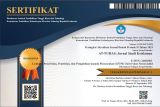Sufi Nasionalis dalam Al-Qur’an: Potret Intelektual Islam Nasionalis Berkepribadian Wasathiyah
(1) * M. Rais Akbar
 (STAI Al Fithrah Surabaya)
(STAI Al Fithrah Surabaya) Indonesia
(*) Corresponding Author
AbstractThe determination of Pancasila as the basis of the state is fundamental to the state. Because the basis of the state can be positioned as a reference for the compilation of a constitution. Since being positioned as the basis of the state, its position has been shaken due to the feud between Islamic intellectuals in responding to problems with the form and system of government in Indonesia. In fact, for a country, building the foundation of the state or the basis of state philosophy (philosofische grondslog) is a fundamental thing. In these three disputes, there are paradigm patterns, namely the fundamentalist paradigm (intending to implement Islamic law as an Islamic state), the reform paradigm (only inserting substantial religious values into the government system), and the accommodationist paradigm (cooperative with existing governments). These three paradigms have always adorned the zones of Islamic political thought in Indonesia. This paper aims to produce Islamic thinkers who accept the position of Pancasila with the nationalist Sufi initials. Because a Sufi is a Muslim who is more deeply Islamic. Through the exploration of the verses of the Al-Qur'an on humanity and unity, the writer finds this nationalist Sufi portrait as a human being who deserves to be the caliph of Allah Ta'ala on earth. Keywords: Al-Qur'an, Sufi, Nationalist, Humanity, Pancasila |
Full Text: PDF
Refbacks
- There are currently no refbacks.
Copyright (c) 2020 M. Rais Akbar
This journal is licensed under a
Creative Commons Attribution-ShareAlike 4.0 International License





.png)






